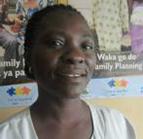In Recognition of FP Providers on International Women’s Day
 In recognition of International Women’s Day on March 8, we would like to applaud the frontline family planning providers, who help women and their partners make decisions that keep mothers, children and families healthy and strong. According to the UN, about 222 million women in the developing world would like to plan their pregnancies but they lack access to modern contraceptives. Closely spaced pregnancies can also lead to early death from childbearing, especially in countries like Nigeria where maternal mortality rates remain high and family planning use is stagnant.
In recognition of International Women’s Day on March 8, we would like to applaud the frontline family planning providers, who help women and their partners make decisions that keep mothers, children and families healthy and strong. According to the UN, about 222 million women in the developing world would like to plan their pregnancies but they lack access to modern contraceptives. Closely spaced pregnancies can also lead to early death from childbearing, especially in countries like Nigeria where maternal mortality rates remain high and family planning use is stagnant.
To address this problem among urban poor women in Nigeria, the Bill and Melinda Gates Foundation funded the Nigerian Urban Reproductive Health Initiative (NUHRI), a five-year project designed to increase the contraceptive prevalence rate by removing supply and demand barriers to family planning use. And mid-term results just out of Nigeria show this balanced approach that addresses service delivery improvement while creating consumer demand is working so far.
Knowledge of family planning methods has soared in Abuja, Ibadan, Ilorin and Kaduna. For example in Abuja, knowledge of any method was 66.9% at baseline back in 2009, but is 87.7% in the latest data. And the number of women using traditional or modern methods is moving up as well. In Kaduna, the percentage of women using contraception went from 16% to 28% at the mid-term evaluation.
These results are due to a multifaceted strategy that includes a mass media campaign, a targeted effort to reach tradition and religious leaders, the provision of free contraceptives, and a focus on the frontline family planning service providers.
As part of the focus on providers, NUHRI developed a novel public-private partnership, the Family Planning Providers Network (FPPN), to connect all family planning providers in Nigeria – clinical and non-clinical as well as public and private. A service referral system among the providers ensures clients receive the contraceptive method that best fits their needs and lifestyle. Youth urban social mobilizers also provide community-level referrals, assessing women’s unmet need for quality family planning services and referring them to an FPPN provider.
The project also focused on improving the quality of service delivery, including intensive provider trainings and 72-hour clinic makeovers. And NUHRI addressed barriers due to provider biases, such as limiting family planning to married women only or those who already had children.
One frontline family planning provider in the densely populated Nigerian city of Ibadan credits NUHRI for increasing the number of clients at her primary health clinic. Mrs. Aremu says free contraceptives and NURHI’s efforts to increase awareness and resolve misconceptions about FP led to the marked increase.
“From my point of view, family planning simply means having children by choice and not by chance. It also makes a mother healthy and able to care for her children properly,” she said.
Without providers like Mrs. Aremu on the frontlines, the NUHRI project and other FP campaigns would likely fall well short of their goals. And more women would die needlessly from having too many babies too close together. On International Women’s Day we should honor providers like Mrs. Aremu for their tireless efforts on the frontlines of the fight to save women’s lives in the developing world.
The NUHRI project is implemented by the Johns Hopkins Bloomberg School of Public Health Center for Communication Programs.
More on NUHRI.





Leave a Reply
Want to join the discussion?Feel free to contribute!